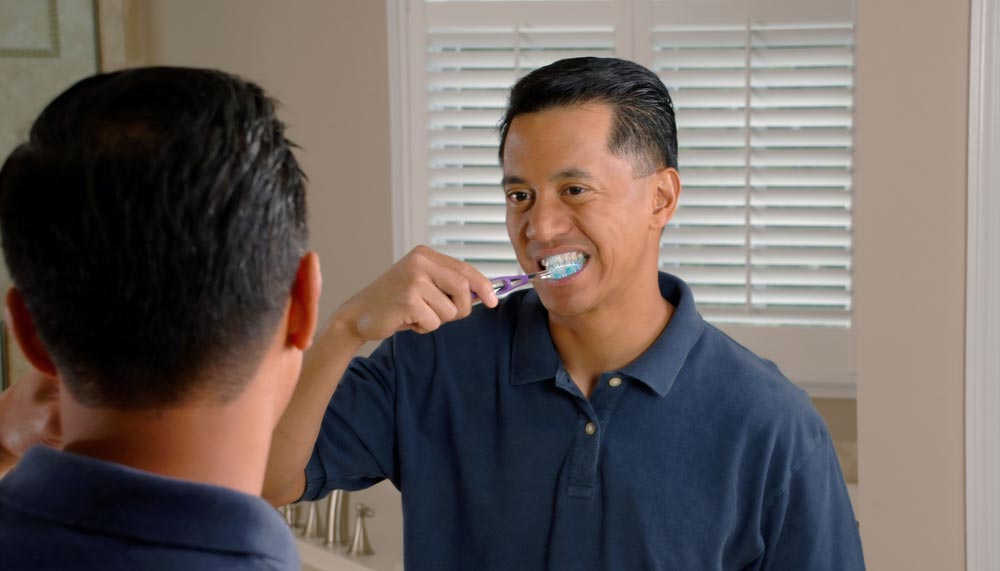From enjoying the delicious flavor to drinking it in the morning to wake yourself up, coffee drinking is an important part of your daily routine. On average, Americans drink 2.1 coffee cups per day. If you are a coffee lover, you will be happy to learn that coffee can promote heart health. Additionally, it boosts liver function, promotes stomach cleansing, mental health, and is rich in antioxidants. While it may seem helpful for your mental and physical health, consuming an excessive amount of coffee each day can harm your dental health in negative ways affecting your teeth, gums, and mouth.
So, attention coffee drinkers: Your morning habit can affect your oral health. If it is capable of staining your clothes, it is also capable of staining your teeth. This rule of thumb is also true for coffee. Coffee includes tannins, a kind of polyphenol that degrades in water. Additionally, they are found in drinks such as tea.
Tannins promote the adhesion of color chemicals to your teeth. When these chemicals stick, they might provide an undesirable yellow tint. It takes only one cup of coffee every day to discolor teeth.
The question is how can you avoid teeth discoloration or other oral side effects of coffee while drinking your favorite coffee regularly?

What Happens When You Drink Little Bit Coffee (1-2 Cups A Day Everyday)
Two cups of coffee a day is considered to be safe for health. Although it is true that coffee contains a lot of caffeine, it is also rich in vitamins and minerals that have the potential to speed up your metabolism, and sometimes we just need it to stay awake.
Additionally, a daily drink of coffee helps in burning fat, boosts alertness, energy, and athletic performance, makes you happier, decreases depression, may aid in the battle against Parkinson’s and offers protection against liver disease(1, 2).
While one or two cups of coffee are an excellent option for boosting mental and physical health but unfortunately it is not the best option for oral health.
Teeth Stains
You may be astonished to find that one cup of coffee per day is all it takes to discolor your teeth and affect your overall dental health. If you consume numerous cups of coffee each day, your teeth might get severely stained and discolored(3).
While the surface of your teeth may appear smooth, the layer of enamel that covers your teeth is filled with racks and ridges. Food pigments and particles from various beverages, for example, coffee can become trapped in teeth ridges and cracks, discoloring the teeth’ surface.
Coffee stains will grow increasingly difficult to remove without intervention, such as regular brushing, frequent dental cleanings by the dentist, and whitening treatments.
One common misunderstanding is that adding milk or creamer to coffee can help prevent stains. However, this is not true. While the creamer or milk will lighten the coffee, it will not reduce the black pigments in the coffee that stain the teeth.
So, there is a limit to drinking coffee. Depending on the size of the coffee you’re drinking, you may choose to take a break a bit sooner. It is suggested that no one’s daily limit of drinking coffee should not surpass 400mg (which is about 4 regular-sized, 8 oz cups of coffee(4, 5) Obviously, drink responsibly, but increasing coffee consumption on a daily basis has been related to anxiety and irregular heartbeat.
In general, two cups are sufficient (depending on the size) and may even be beneficial! Always, though, take a minute to notice how your brain responds to caffeine.

What Happens When You Drink Too Much (6 to7 Cups A Day Everyday)
Excessive coffee drinking is bad for physical, mental, and as well as oral health. If you drink an excessive amount of coffee in a short period of time, you can experience the following physical and mental symptoms: anxiety, dizziness, insomnia, fast heartbeat, tremors, irritability, restlessness, and upper stomach irritability.
1. Enamel Erosion
Coffee has an effect on more than just the color of your teeth’ enamel. Consuming this caffeinated beverage in excess can potentially damage the tooth enamel. Coffee contains different acids which erode tooth enamel, allowing food particles and germs to enter the teeth(6).
Bacteria can infiltrate the gum tissue and teeth increasing the risk of gum disease, decay, and cavities. If gum diseases, decay, and cavities, left untreated, can result in severe infections and the loss of one or more teeth.
2. Gum diseases
The periodontal infection affects the supporting structure of the teeth. This early stage of gum disease is known as Gingivitis that primarily affects the gums. People frequently ignore plaque accumulation on their teeth, which gradually spreads to the gum line, resulting in gingivitis. If left untreated, the infection takes the form of (bacteria) periodontal pockets, which can eventually damage the tooth’s connective tissue and alveolar bone. This disease is treated by cleaning the gums and surgically removing the periodontal pockets in order to control/eradicate the subgingival germs(7).
Additionally, excessive coffee intake has been linked to endothelial dysfunction and increased inflammation. Numerous studies have previously shown a relationship between coffee consumption and periodontal disease. The one that captured the public’s attention for several months was the Korea National Health and Nutrition Examination Survey, which included 7,299 male participants(8).
The researchers noted that one of coffee’s primary constituents, caffeine, negatively affects e bone healing process and can result in increased bone loss. As we know an average cup of coffee contains between 70 and 100 milligrams of caffeine. Additionally, it can lead to disease progression in individuals with periodontitis.
Furthermore, the Korean research team suggested that individuals with periodontal disease limit their coffee use. Thus, this study demonstrated a direct relationship between coffee use and gingivitis.
- Dry mouth
Saliva is a vital part of oral hygiene. It helps to keep your mouth moist and aids in the removal of food particles and germs. Saliva also contains minerals that aid in the re-mineralization of tooth enamel. Unfortunately, drinking a lot of caffeinated coffee dries out the mouth, reducing required saliva production for dental health(9).
Inadequate saliva causes your mouth to dry up, which can also result in irritated gum tissue. Without sufficient saliva, you may develop ulcers on the gums, tongue, and interior of the mouth. Finally, a dry mouth can result in an unpleasant and uncomfortable coffee breath.
4. Bad breath
Without following a regular oral health care routine, all meals and beverages can result in foul breath. Coffee is no exception. Coffee has a reputation for having a particularly strong odor(10). Unless the halitosis is treated, coffee adheres on the tongue and can cause foul breath for longer periods. Bad breath can have an adverse effect on how your mouth feels and can also lower your self-esteem. One of the easiest ways to get rid of coffee breath is to sip water and scrape your mouth with a tongue scraper.

Do different types of coffee have different effects on oral health?
Each coffee has its own effect on oral health.
1) Effect of Milk Coffee
Milk coffee contains very little amount of caffeine, so it is safe to drink. You can drink four to five cups of this coffee per day. It does not stain your teeth, cause dry mouth, or erode enamel. After coffee, use drinking water to help rinse the mouth, it prevents discoloration on the teeth. Combined with milk, white coffee will not stain your teeth compared to black coffee. The same goes for tea!
2) Effect of Coffee with Sugar
As long as your tea or coffee does not include sugar, the risk of tooth decay is fairly minimal. On the other hand, every time we consume a sugary beverage, we support the growth of decay-causing bacteria in our mouths(11). If you’ve had a lot of fillings during your life, sugar must have certainly played a significant part. Sugar is present in almost everything we eat, so avoid adding any additional sugar to your regular beverages, especially given how much time we spend drinking.
If you really must sweeten your coffee, consider using an artificial sweetener, which does not cause tooth decay, and gradually wean off over time.
3) Effect of Espresso
Espresso is created by squeezing finely crushed coffee beans with a tiny amount of hot water or steam. Although espresso has more caffeine per volume than ordinary coffee, it has less caffeine per serving due to the tiny size of espresso cups.
A shot of espresso contains around 63 mg of caffeine and is usually 30–50 ml (1–1.75 oz).
As a result, a double shot of espresso contains about 125 milligrams of caffeine. That means you can drink two to three cups of espresso per day. As maximum safe limit is 400mg per day.
However, excess espresso drinking can promote the growth of germs in your mouth, resulting in enamel and tooth loss. This might result in your teeth being fragile and thin(12).
Furthermore, espresso is better than coffee as it is filtered out and contains less caffeine than drip coffee.
4) Effect of Instant coffee
Instant coffee is created from freeze-dried or spray-dried brewed coffee. Generally, it comes in huge, dry chunks that dissolve in water. Instant coffee often has less caffeine compared to regular coffee, with around 30–90 mg per cup(13). This type of coffee is safe for oral health. However, very mild teeth staining can occur.
5) Effect of Black Coffee
Numerous people ask the question is black coffee harmful to my teeth? The short answer is “yes,”.
Black coffee is quite acidic, and if you drink a lot of it, you may be eroding your enamel and fostering bacteria development in your mouth. This can result in tooth decay and, in severe cases, gum disease.
However, do not despair just yet. Black coffee has a PH of roughly 5 and is mildly acidic. In comparison, orange juice has a pH of around 3.88. (Lower pH means higher acidity). Black coffee is not that harmful to your teeth.
In general, as long as you clean your teeth after drinking your black coffee in the morning, you should be OK. Drinking black coffee is unlikely to give you any oral health problems if you maintain adequate dental hygiene and eat a good oral diet.
- Effect of Decaf Coffee
Although the name may lead you to believe otherwise, decaf coffee is not completely caffeine-free.
Caffeine content varies from 0–7 mg per cup, with the average cup holding 3 mg(14, 15). Decaf coffee also contains very little amount of caffeine, so it is less likely to cause dental staining and oral health issues.
According to the FDA-Approved Source, an 8 oz cup of regular coffee contains around 80–100 mg of caffeine.
Additionally, green and black teas contain a higher caffeine content than decaf coffee. A normal 8 oz cup of black or green tea has around 30–50 mg of caffeine.
However, variations can occur depending on the kind of coffee, the technique of decaffeination, and the cup size.

Takeaway….
Coffee has its own benefits and disadvantages. One or two cups of coffee per day will not harm your teeth, they can produce slight discoloration. The problem occurs when you drink too much. Excess coffee drinking can cause tooth decay, enamel erosion, and gingivitis. Therefore, 400 mg of caffeine per day — the equivalent of four cups (945 ml) of coffee — is considered safe for most healthy persons. So, you can drink 4–5 cups of coffee per day safely. However, it is recommended that you brush your teeth after drinking coffee to prevent minor staining.
References
1. Butt MS, Sultan MTJCrifs, nutrition. Coffee and its consumption: benefits and risks. 2011;51(4):363-73.
2. Bae J-H, Park J-H, Im S-S, Song D-KJImr. Coffee and health. 2014;3(4):189-91.
3. Omata Y, Uno S, Nakaoki Y, Tanaka T, Sano H, Yoshida S, et al. Staining of hybrid composites with coffee, oolong tea, or red wine. 2006;25(1):125-31.
4. Higdon JV, Frei B. Coffee and health: a review of recent human research. Critical reviews in food science and nutrition. 2006;46(2):101-23.
5. Nawrot P, Jordan S, Eastwood J, Rotstein J, Hugenholtz A, Feeley M. Effects of caffeine on human health. Food additives and contaminants. 2003;20(1):1-30.
6. Manno SH, Manno FA, Ahmed I, Ahmed R, Shu L, Li L, et al. Spectroscopic examination of enamel staining by coffee indicates dentin erosion by sequestration of elements. 2018;189:550-9.
7. Han K, Hwang E, Park J-BJPo. Association between consumption of coffee and the prevalence of periodontitis: The 2008–2010 Korea National Health and Nutrition Examination Survey. 2016;11(7):e0158845.
8. Ng N, Kaye EK, Garcia RIJJop. Coffee consumption and periodontal disease in males. 2014;85(8):1042-9.
9. Scully Cbe CJOd. Drug effects on salivary glands: dry mouth. 2003;9(4):165-76.
10. Gov Y, Sterer N, Rosenberg M. In vitro effect of coffee on oral malodor-related parameters. Journal of breath research. 2010;4(2):026004.
11. Wetton NM, McWhirter JJI-brAsfqr. Images and Curriculum Development. 1998:263.
12. Petti S, Scully CJJod. Polyphenols, oral health and disease: A review. 2009;37(6):413-23.
13. Ludwig IA, Mena P, Calani L, Cid C, Del Rio D, Lean ME, et al. Variations in caffeine and chlorogenic acid contents of coffees: what are we drinking? Food & function. 2014;5(8):1718-26.
14. Barone JJ, Roberts HR. Caffeine consumption. Food and chemical toxicology : an international journal published for the British Industrial Biological Research Association. 1996;34(1):119-29.
15. McCusker RR, Fuehrlein B, Goldberger BA, Gold MS, Cone EJ. Caffeine content of decaffeinated coffee. Journal of analytical toxicology. 2006;30(8):611-3.


Leave a Reply